As Requested On My Stream, A Simple Water Tutorial!





as requested on my stream, a simple water tutorial!
More Posts from Quandrixing and Others
I feel like I should make a post about this because it’s not something that’s very well-known, and that Americans in particular may need to know about given the uncertain state of our healthcare system at the moment. I’ve wanted to write this out for a while, It’s kind of a long post, so sorry about that!
If you have an emergency and have to go to the hospital, you’ll owe the hospital a lot of money. (I got into a car wreck and broke my ankle and my arm. My hospital bill was around $20,000)
You’ll also owe the ambulance provider, if you need one. (My ambulance bill was about $800)
You may get separate bills from the anesthesiologist or surgeon. (My anesthesiologist bill was $1,700)
You may need follow-up appointments. (My orthopedic surgeon billed me for the appointments and his surgery together and it was about $1,000)
You’ve also got to pay for medical equipment you need afterward, like crutches or a walking boot. (Mine cost about $75)
Altogether, I ended up with almost $24,000 in medical debt from one car accident. That’s a really scary number for someone like me who makes $10/hr at a 12 hour a week job.
I got my debt down to $1075 by making some phone calls and submitting some paperwork.
The first thing I did was contact the hospital. They don’t make it easy to find, but many hospitals (perhaps most hospitals?) have financial assistance programs for people who can’t afford medical bills. I don’t make a lot of money, and I have bills to pay, so they were able to help me. I called the billing department and asked if they had any assistance programs for low income people who can’t pay their bills. I had to call multiple times, and I got transferred in circles by people who didn’t know what I was talking about. Finally, I got an appointment with someone in “Eligibility Services” (I don’t know what other hospitals call it, if it’s something different). I had to bring my pay stubs and copies of all of my bills. When I got to the hospital for the appointment, nobody knew what I was talking about so I had to wander a little to find where I needed to go. I spoke with the guy in Eligibility Services, and I waited for a decision on how much of the bill they would forgive. A month later, I got a call telling me it was totally forgiven.
I did the same thing for my ambulance bill and my anesthesiologist, but the process was a LOT easier. I just had to mail some paperwork and it was totally forgiven.
I didn’t bother with the medical equipment suppliers, since the bills came from separate companies and I didn’t feel like going through the process twice for $75. I was assured at the hospital that they had similar programs for debt forgiveness, so I could have probably avoided paying that too.
The only thing I couldn’t get taken care of was the surgeon/follow-up appointment cost, but they were able to put me on a no-interest payment plan.
Medical debt is scary because it’s something that can come from stuff that’s already really scary. I didn’t need the burden of $24,000 in debt on top of trying to get around on a crutch with a broken arm (it’s not easy, believe me!).. but I can’t imagine what it would be like with a bigger debt or a more severe medical emergency. I see lots of people in even worse trouble than I was in, both financially and medically. Please know that there are options for you when that GoFundMe doesn’t do enough. Even if your income is higher than mine, it’s worth a shot even for partial debt forgiveness.
The Neurodivergent Writer’s Guide to Fun and Productivity
(Even when life beats you down)
Look, I’m a mom, I have ADHD, I’m a spoonie. To say that I don’t have heaps of energy to spare and I struggle with consistency is an understatement. For years, I tried to write consistently, but I couldn’t manage to keep up with habits I built and deadlines I set.
So fuck neurodivergent guides on building habits, fuck “eat the frog first”, fuck “it’s all in the grind”, and fuck “you just need time management”—here is how I manage to write often and a lot.
Focus on having fun, not on the outcome
This was the groundwork I had to lay before I could even start my streak. At an online writing conference, someone said: “If you push yourself and meet your goals, and you publish your book, but you haven’t enjoyed the process… What’s the point?” and hoo boy, that question hit me like a truck.
I was so caught up in the narrative of “You’ve got to show up for what’s important” and “Push through if you really want to get it done”. For a few years, I used to read all these productivity books about grinding your way to success, and along the way I started using the same language as they did. And I notice a lot of you do so, too.
But your brain doesn’t like to grind. No-one’s brain does, and especially no neurodivergent brain. If having to write gives you stress or if you put pressure on yourself for not writing (enough), your brain’s going to say: “Huh. Writing gives us stress, we’re going to try to avoid it in the future.”
So before I could even try to write regularly, I needed to teach my brain once again that writing is fun. I switched from countable goals like words or time to non-countable goals like “fun” and “flow”.
Rewire my brain: writing is fun and I’m good at it
I used everything I knew about neuroscience, psychology, and social sciences. These are some of the things I did before and during a writing session. Usually not all at once, and after a while I didn’t need these strategies anymore, although I sometimes go back to them when necessary.
I journalled all the negative thoughts I had around writing and try to reason them away, using arguments I knew in my heart were true. (The last part is the crux.) Imagine being supportive to a writer friend with crippling insecurities, only the friend is you.
Not setting any goals didn’t work for me—I still nurtured unwanted expectations. So I did set goals, but made them non-countable, like “have fun”, “get in the flow”, or “write”. Did I write? Yes. Success! Your brain doesn’t actually care about how high the goal is, it cares about meeting whatever goal you set.
I didn’t even track how many words I wrote. Not relevant.
I set an alarm for a short time (like 10 minutes) and forbade myself to exceed that time. The idea was that if I write until I run out of mojo, my brain learns that writing drains the mojo. If I write for 10 minutes and have fun, my brain learns that writing is fun and wants to do it again.
Reinforce the fact that writing makes you happy by rewarding your brain immediately afterwards. You know what works best for you: a walk, a golden sticker, chocolate, cuddle your dog, whatever makes you happy.
I conditioned myself to associate writing with specific stimuli: that album, that smell, that tea, that place. Any stimulus can work, so pick one you like. I consciously chose several stimuli so I could switch them up, and the conditioning stays active as long as I don’t muddle it with other associations.
Use a ritual to signal to your brain that Writing Time is about to begin to get into the zone easier and faster. I guess this is a kind of conditioning as well? Meditation, music, lighting a candle… Pick your stimulus and stick with it.
Specifically for rewiring my brain, I started a new WIP that had no emotional connotations attached to it, nor any pressure to get finished or, heaven forbid, meet quality norms. I don’t think these techniques above would have worked as well if I had applied them on writing my novel.
It wasn’t until I could confidently say I enjoyed writing again, that I could start building up a consistent habit. No more pushing myself.
I lowered my definition for success
When I say that nowadays I write every day, that’s literally it. I don’t set out to write 1,000 or 500 or 10 words every day (tried it, failed to keep up with it every time)—the only marker for success when it comes to my streak is to write at least one word, even on the days when my brain goes “naaahhh”. On those days, it suffices to send myself a text with a few keywords or a snippet. It’s not “success on a technicality (derogatory)”, because most of those snippets and ideas get used in actual stories later. And if they don’t, they don’t. It’s still writing. No writing is ever wasted.
A side note on high expectations, imposter syndrome, and perfectionism
Obviously, “Setting a ridiculously low goal” isn’t something I invented. I actually got it from those productivity books, only I never got it to work. I used to tell myself: “It’s okay if I don’t write for an hour, because my goal is to write for 20 minutes and if I happen to keep going for, say, an hour, that’s a bonus.” Right? So I set the goal for 20 minutes, wrote for 35 minutes, and instead of feeling like I exceeded my goal, I felt disappointed because apparently I was still hoping for the bonus scenario to happen. I didn’t know how to set a goal so low and believe it.
I think the trick to making it work this time lies more in the groundwork of training my brain to enjoy writing again than in the fact that my daily goal is ridiculously low. I believe I’m a writer, because I prove it to myself every day. Every success I hit reinforces the idea that I’m a writer. It’s an extra ward against imposter syndrome.
Knowing that I can still come up with a few lines of dialogue on the Really Bad Days—days when I struggle to brush my teeth, the day when I had a panic attack in the supermarket, or the day my kid got hit by a car—teaches me that I can write on the mere Bad-ish Days.
The more I do it, the more I do it
The irony is that setting a ridiculously low goal almost immediately led to writing more and more often. The most difficult step is to start a new habit. After just a few weeks, I noticed that I needed less time and energy to get into the zone. I no longer needed all the strategies I listed above.
Another perk I noticed, was an increased writing speed. After just a few months of writing every day, my average speed went from 600 words per hour to 1,500 wph, regularly exceeding 2,000 wph without any loss of quality.
Talking about quality: I could see myself becoming a better writer with every passing month. Writing better dialogue, interiority, chemistry, humour, descriptions, whatever: they all improved noticeably, and I wasn’t a bad writer to begin with.
The increased speed means I get more done with the same amount of energy spent. I used to write around 2,000-5,000 words per month, some months none at all. Nowadays I effortlessly write 30,000 words per month. I didn’t set out to write more, it’s just a nice perk.
Look, I’m not saying you should write every day if it doesn’t work for you. My point is: the more often you write, the easier it will be.
No pressure
Yes, I’m still working on my novel, but I’m not racing through it. I produce two or three chapters per month, and the rest of my time goes to short stories my brain keeps projecting on the inside of my eyelids when I’m trying to sleep. I might as well write them down, right?
These short stories started out as self-indulgence, and even now that I take them more seriously, they are still just for me. I don’t intend to ever publish them, no-one will ever read them, they can suck if they suck. The unintended consequence was that my short stories are some of my best writing, because there’s no pressure, it’s pure fun.
Does it make sense to spend, say, 90% of my output on stories no-one else will ever read? Wouldn’t it be better to spend all that creative energy and time on my novel? Well, yes. If you find the magic trick, let me know, because I haven’t found it yet. The short stories don’t cannibalize on the novel, because they require different mindsets. If I stopped writing the short stories, I wouldn’t produce more chapters. (I tried. Maybe in the future? Fingers crossed.)
Don’t wait for inspiration to hit
There’s a quote by Picasso: “Inspiration hits, but it has to find you working.” I strongly agree. Writing is not some mystical, muse-y gift, it’s a skill and inspiration does exist, but usually it’s brought on by doing the work. So just get started and inspiration will come to you.
Accountability and community
Having social factors in your toolbox is invaluable. I have an offline writing friend I take long walks with, I host a monthly writing club on Discord, and I have another group on Discord that holds me accountable every day. They all motivate me in different ways and it’s such a nice thing to share my successes with people who truly understand how hard it can be.
The productivity books taught me that if you want to make a big change in your life or attitude, surrounding yourself with people who already embody your ideal or your goal huuuugely helps. The fact that I have these productive people around me who also prioritize writing, makes it easier for me to stick to my own priorities.
Your toolbox
The idea is to have several techniques at your disposal to help you stay consistent. Don’t put all your eggs in one basket by focussing on just one technique. Keep all of them close, and if one stops working or doesn’t inspire you today, pivot and pick another one.
After a while, most “tools” run in the background once they are established. Things like surrounding myself with my writing friends, keeping up with my daily streak, and listening to the album I conditioned myself with don’t require any energy, and they still remain hugely beneficial.
Do you have any other techniques? I’d love to hear about them!
I hope this was useful. Happy writing!
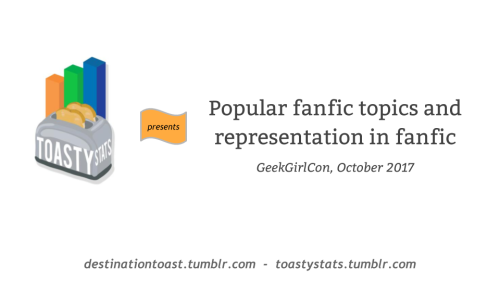
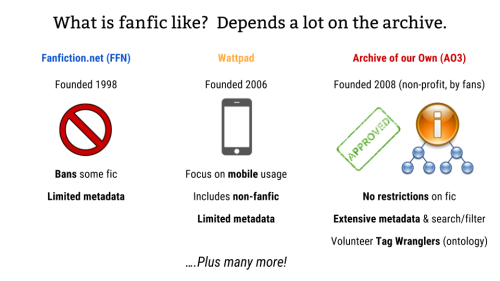
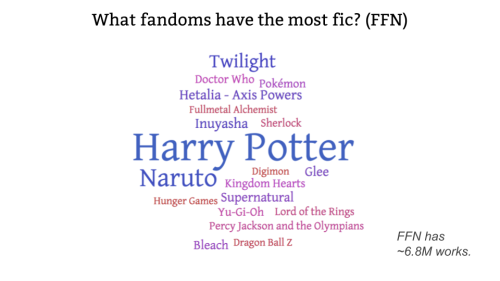
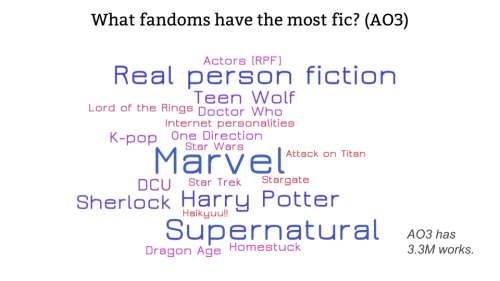
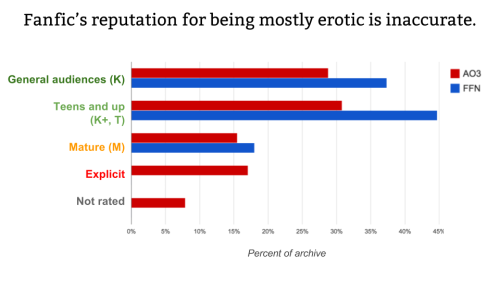
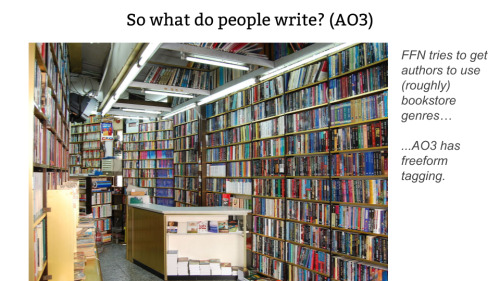
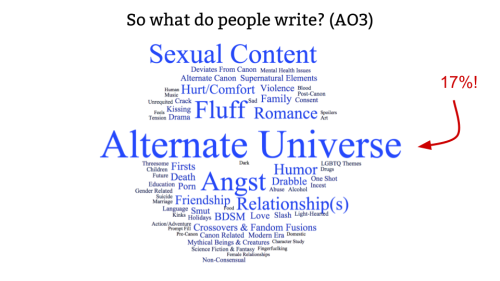
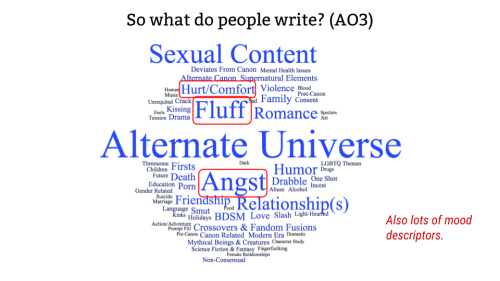
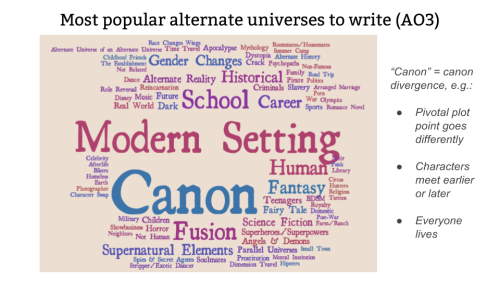
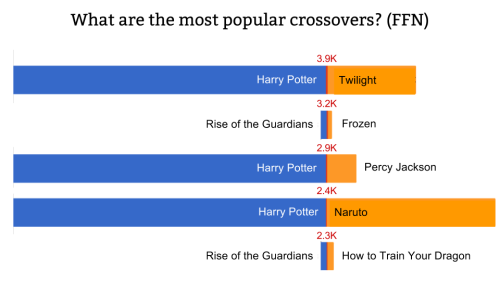
TOASTYSTATS: GEEKGIRLCON 2017
The above are the first half of the slides I presented at GeekGirlCon (along with some annotations to explain things I only said out loud :) ) – for the second half, read more below the cut. I’ll also be sharing the slides from the other presenters here, too, as they’re posted!
The gender representation work is part of a longer analysis that I will be posting in full soon!
Beneath the cut are also a few additional slides that I would have presented with a bit more time – several of which address things that came up in the question session.












…And the extra slides:




Remember when I told ya'll last month to be ready to start looking for a Discord alternative?

Yeah things aren't looking good for discord.
Also I've said this before but advertising is an industry that should be considered as pointless and harmful as fossil fuels.
How to avoid White Room Syndrome
by Writerthreads on Instagram
A common problem writers face is "white room syndrome"—when scenes feel like they’re happening in an empty white room. To avoid this, it's important to describe settings in a way that makes them feel real and alive, without overloading readers with too much detail. Here are a few tips below to help!
Focus on a few key details
You don’t need to describe everything in the scene—just pick a couple of specific, memorable details to bring the setting to life. Maybe it’s the creaky floorboards in an old house, the musty smell of a forgotten attic, or the soft hum of a refrigerator in a small kitchen. These little details help anchor the scene and give readers something to picture, without dragging the action with heaps of descriptions.
Engage the senses
Instead of just focusing on what characters can see, try to incorporate all five senses—what do they hear, smell, feel, or even taste? Describe the smell of fresh bread from a nearby bakery, or the damp chill of a foggy morning. This adds a lot of depth and make the location feel more real and imaginable.
Mix descriptions with actions
Have characters interact with the environment. How do your characters move through the space? Are they brushing their hands over a dusty bookshelf, shuffling through fallen leaves, or squeezing through a crowded subway car? Instead of dumping a paragraph of description, mix it in with the action or dialogue.
Use the setting to reflect a mood or theme
Sometimes, the setting can do more than just provide a backdrop—it can reinforce the mood of a scene or even reflect a theme in the story. A stormy night might enhance tension, while a warm, sunny day might highlight a moment of peace. The environment can add an extra layer to what’s happening symbolically.
Here's an example of writing a description that hopefully feels alive and realistic, without dragging the action:
The bookstore was tucked between two brick buildings, its faded sign creaking with every gust of wind. Inside, the air was thick with the scent of worn paper and dust, mingling with the faint aroma of freshly brewed coffee from a corner café down the street. The wooden floorboards groaned as Ella wandered between the shelves, her fingertips brushing the spines of forgotten novels. Somewhere in the back, the soft sound of jazz crackled from an ancient radio.
Hope these tips help in your writing!

Warden Davrin
crown jewel/stained glass jello cakes are like beautiful angels to me. it's fruity and delicious. it's retro kitsch. it's an edible example of midcentury minimalist art in every cross section.

i understand the 50s housewife appeal here. if i rolled up to the potluck with a fugly cobbler and my neighbor brought one of these i may have to end my stupid sloppy fruit life.
-
 pineappleeffect liked this · 1 week ago
pineappleeffect liked this · 1 week ago -
 pineappleeffect reblogged this · 1 week ago
pineappleeffect reblogged this · 1 week ago -
 ieatshrapnel liked this · 1 week ago
ieatshrapnel liked this · 1 week ago -
 fleshbook liked this · 1 week ago
fleshbook liked this · 1 week ago -
 alienatedbug liked this · 1 week ago
alienatedbug liked this · 1 week ago -
 purple-bloom liked this · 1 week ago
purple-bloom liked this · 1 week ago -
 kawaiiyumiki liked this · 1 week ago
kawaiiyumiki liked this · 1 week ago -
 faintlyazure liked this · 1 week ago
faintlyazure liked this · 1 week ago -
 cryptidcosmicist reblogged this · 1 week ago
cryptidcosmicist reblogged this · 1 week ago -
 cryptidcosmicist liked this · 1 week ago
cryptidcosmicist liked this · 1 week ago -
 bluerifts liked this · 2 weeks ago
bluerifts liked this · 2 weeks ago -
 galactaknightyaoi liked this · 2 weeks ago
galactaknightyaoi liked this · 2 weeks ago -
 heiiyr liked this · 2 weeks ago
heiiyr liked this · 2 weeks ago -
 justiiiiiiiiiii liked this · 2 weeks ago
justiiiiiiiiiii liked this · 2 weeks ago -
 thefifthcoloroftherainbow liked this · 2 weeks ago
thefifthcoloroftherainbow liked this · 2 weeks ago -
 somewhere-underwater reblogged this · 2 weeks ago
somewhere-underwater reblogged this · 2 weeks ago -
 carouselingcircus liked this · 2 weeks ago
carouselingcircus liked this · 2 weeks ago -
 signaltransmit liked this · 2 weeks ago
signaltransmit liked this · 2 weeks ago -
 matoimech liked this · 2 weeks ago
matoimech liked this · 2 weeks ago -
 stainedcolors reblogged this · 2 weeks ago
stainedcolors reblogged this · 2 weeks ago -
 slightysquishycheese liked this · 2 weeks ago
slightysquishycheese liked this · 2 weeks ago -
 aciinonyx liked this · 2 weeks ago
aciinonyx liked this · 2 weeks ago -
 chu-che liked this · 2 weeks ago
chu-che liked this · 2 weeks ago -
 hunii-bun liked this · 2 weeks ago
hunii-bun liked this · 2 weeks ago -
 its-a-cryingnebula reblogged this · 3 weeks ago
its-a-cryingnebula reblogged this · 3 weeks ago -
 its-a-cryingnebula liked this · 3 weeks ago
its-a-cryingnebula liked this · 3 weeks ago -
 d-blue02 reblogged this · 3 weeks ago
d-blue02 reblogged this · 3 weeks ago -
 d-blue02 liked this · 3 weeks ago
d-blue02 liked this · 3 weeks ago -
 okultraoldmanyaoi liked this · 3 weeks ago
okultraoldmanyaoi liked this · 3 weeks ago -
 chika-pili liked this · 3 weeks ago
chika-pili liked this · 3 weeks ago -
 calciferous-kelpie reblogged this · 3 weeks ago
calciferous-kelpie reblogged this · 3 weeks ago -
 craftywombatfairy reblogged this · 3 weeks ago
craftywombatfairy reblogged this · 3 weeks ago -
 mutimeat reblogged this · 3 weeks ago
mutimeat reblogged this · 3 weeks ago -
 mutimeat liked this · 3 weeks ago
mutimeat liked this · 3 weeks ago -
 nickname-x reblogged this · 3 weeks ago
nickname-x reblogged this · 3 weeks ago -
 statisticalhehe liked this · 3 weeks ago
statisticalhehe liked this · 3 weeks ago -
 breakcorepup reblogged this · 3 weeks ago
breakcorepup reblogged this · 3 weeks ago -
 breakcorepup liked this · 3 weeks ago
breakcorepup liked this · 3 weeks ago -
 fireladyofink liked this · 3 weeks ago
fireladyofink liked this · 3 weeks ago -
 leastlikedminecraftmob liked this · 3 weeks ago
leastlikedminecraftmob liked this · 3 weeks ago -
 autumnalchemist reblogged this · 3 weeks ago
autumnalchemist reblogged this · 3 weeks ago -
 germanyballartsandanimations liked this · 3 weeks ago
germanyballartsandanimations liked this · 3 weeks ago -
 high-priestess-of-daydreams liked this · 3 weeks ago
high-priestess-of-daydreams liked this · 3 weeks ago -
 br4mblr liked this · 3 weeks ago
br4mblr liked this · 3 weeks ago -
 opalescent-inkwell reblogged this · 3 weeks ago
opalescent-inkwell reblogged this · 3 weeks ago -
 ayochisan liked this · 4 weeks ago
ayochisan liked this · 4 weeks ago -
 eldritchcider liked this · 4 weeks ago
eldritchcider liked this · 4 weeks ago -
 ruberrvulpes liked this · 4 weeks ago
ruberrvulpes liked this · 4 weeks ago -
 a-lil-doodler liked this · 4 weeks ago
a-lil-doodler liked this · 4 weeks ago



